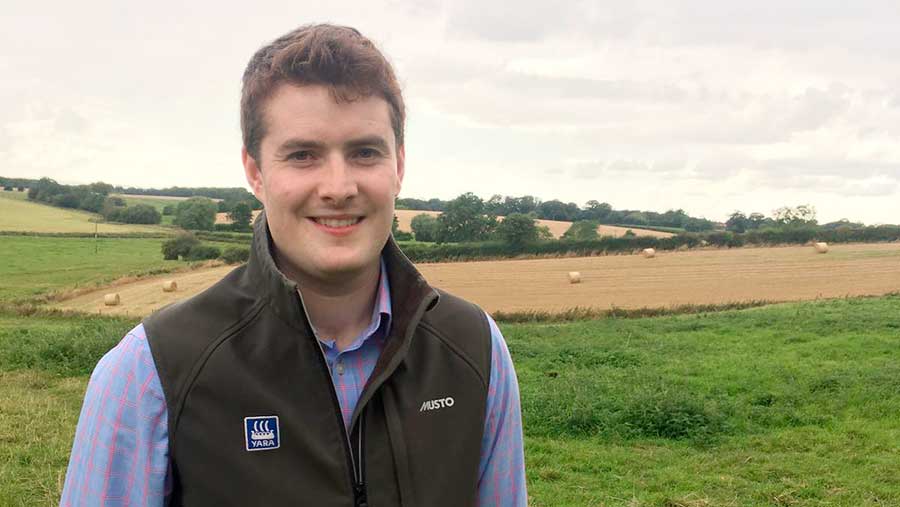Job profile: What’s it like to work in crop nutrition?
 Tom Robertson
Tom Robertson Working for a major fertiliser company can offer plenty of variety, as you are likely to be working with every sector of the farming industry.
The role of an area manager is particularly diverse, too – one day you could be on farm helping to write crop nutrition plans, and the next you could be in the office dealing with marketing issues.
Farmers Weekly asks Tom Robertson to give an insight into his role.
Name Tom Robertson
Age 25
Job title Area manager
Company Yara UK
See also: What’s it like to be a plant breeder
Sum up your job in a sentence or two
I’m an area manager for fertiliiser and crop nutrition company Yara, looking after the South Wales, Herefordshire and Worcestershire region and its merchants/agents.
I focus on providing the best level of agronomic support possible to Yara customers and distributors.
I’m also responsible for managing the marketing effort and the needs of that area.
What does this involve day to day?
There’s always the admin side to look after. Apart from that, you can be on farm helping to write crop nutrition plans, dealing with a complaint or visiting Yara merchants/agents to see how you can help them.
What do you most enjoy about your job?
I work with arable, sheep and beef, dairy and vegetable farms. Each is different and you have to be on your toes.
What can be the downside?
Dealing with complaints is never a fun job, but it’s an opportunity to get everything resolved fairly.
If a farmer has a problem and you can help, the vast majority of the time people are very grateful.
What percentage of your job is office-based?
It’s completely dependent on the time of year.
Spring is a very busy period for us and we tend to be out and about most of the time, whereas during harvest you’re slightly more office-based to catch up on the admin you may have missed!
Throughout the year I would say it’s about 50/50.
What skills and qualifications are essential to do the job?
Being Facts qualified is the most important, with good knowledge of soil and water management. A Basis qualification is desirable.
Being keen to learn is by far the most important attribute, though. I’m a big believer that hard work and a good attitude will get you a long way.
What experience did you have before starting?
I grew up on a farm in Northumberland and have worked at harvest, lambing and calving during holidays for most of my life.
I then attended the Royal Agricultural University at Cirencester and completed a degree in agricultural management.
I had little to no experience within the corporate world before Yara.
What other careers did you consider?
Grain trading and crop nutrition were the two areas I was most interested in.
I enjoy being out on farm helping as much as I can, so the natural route for me was crop nutrition.
What tips/advice would you give to someone wanting a similar role?
Get some real, on-farm experience. The technical aspects of the job can be learned via different courses or as you spend more time in the company, but understanding how the farm business works day-to-day is essential.
Where do you see yourself in five years’ time?
I’m hoping to keep progressing within this sector. No one knows how Brexit will pan out, but I think being open to change and willing to adapt will be essential in years to come.
Give us an idea of the salary a new starter in your sector might expect
Salary is dependent on experience, but a graduate starter could expect to receive in the range of £21,000-£27,000/year, with the opportunity to develop further.
What’s the best bit of career advice you’ve been given?
You have two ears and one mouth – use them in proportion. You can learn a lot from other people by listening and asking concise questions.

